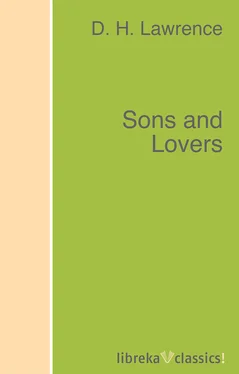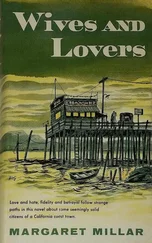D. Lawrence - Sons and Lovers
Здесь есть возможность читать онлайн «D. Lawrence - Sons and Lovers» — ознакомительный отрывок электронной книги совершенно бесплатно, а после прочтения отрывка купить полную версию. В некоторых случаях можно слушать аудио, скачать через торрент в формате fb2 и присутствует краткое содержание. ISBN: , Жанр: Языкознание, на английском языке. Описание произведения, (предисловие) а так же отзывы посетителей доступны на портале библиотеки ЛибКат.
- Название:Sons and Lovers
- Автор:
- Жанр:
- Год:неизвестен
- ISBN:9783742901897
- Рейтинг книги:4 / 5. Голосов: 1
-
Избранное:Добавить в избранное
- Отзывы:
-
Ваша оценка:
- 80
- 1
- 2
- 3
- 4
- 5
Sons and Lovers: краткое содержание, описание и аннотация
Предлагаем к чтению аннотацию, описание, краткое содержание или предисловие (зависит от того, что написал сам автор книги «Sons and Lovers»). Если вы не нашли необходимую информацию о книге — напишите в комментариях, мы постараемся отыскать её.
Immerse yourself in well-known and popular titles!
Sons and Lovers — читать онлайн ознакомительный отрывок
Ниже представлен текст книги, разбитый по страницам. Система сохранения места последней прочитанной страницы, позволяет с удобством читать онлайн бесплатно книгу «Sons and Lovers», без необходимости каждый раз заново искать на чём Вы остановились. Поставьте закладку, и сможете в любой момент перейти на страницу, на которой закончили чтение.
Интервал:
Закладка:
At last Mrs. Morel despised her husband. She turned to the child; she turned from the father. He had begun to neglect her; the novelty of his own home was gone. He had no grit, she said bitterly to herself. What he felt just at the minute, that was all to him. He could not abide by anything. There was nothing at the back of all his show.
There began a battle between the husband and wife—a fearful, bloody battle that ended only with the death of one. She fought to make him undertake his own responsibilities, to make him fulfill his obligations. But he was too different from her. His nature was purely sensuous, and she strove to make him moral, religious. She tried to force him to face things. He could not endure it—it drove him out of his mind.
While the baby was still tiny, the father's temper had become so irritable that it was not to be trusted. The child had only to give a little trouble when the man began to bully. A little more, and the hard hands of the collier hit the baby. Then Mrs. Morel loathed her husband, loathed him for days; and he went out and drank; and she cared very little what he did. Only, on his return, she scathed him with her satire.
The estrangement between them caused him, knowingly or unknowingly, grossly to offend her where he would not have done.
William was only one year old, and his mother was proud of him, he was so pretty. She was not well off now, but her sisters kept the boy in clothes. Then, with his little white hat curled with an ostrich feather, and his white coat, he was a joy to her, the twining wisps of hair clustering round his head. Mrs. Morel lay listening, one Sunday morning, to the chatter of the father and child downstairs. Then she dozed off. When she came downstairs, a great fire glowed in the grate, the room was hot, the breakfast was roughly laid, and seated in his armchair, against the chimney-piece, sat Morel, rather timid; and standing between his legs, the child—cropped like a sheep, with such an odd round poll—looking wondering at her; and on a newspaper spread out upon the hearthrug, a myriad of crescent-shaped curls, like the petals of a marigold scattered in the reddening firelight.
Mrs. Morel stood still. It was her first baby. She went very white, and was unable to speak.
"What dost think o' 'im?" Morel laughed uneasily.
She gripped her two fists, lifted them, and came forward. Morel shrank back.
"I could kill you, I could!" she said. She choked with rage, her two fists uplifted.
"Yer non want ter make a wench on 'im," Morel said, in a frightened tone, bending his head to shield his eyes from hers. His attempt at laughter had vanished.
The mother looked down at the jagged, close-clipped head of her child. She put her hands on his hair, and stroked and fondled his head.
"Oh—my boy!" she faltered. Her lip trembled, her face broke, and, snatching up the child, she buried her face in his shoulder and cried painfully. She was one of those women who cannot cry; whom it hurts as it hurts a man. It was like ripping something out of her, her sobbing.
Morel sat with his elbows on his knees, his hands gripped together till the knuckles were white. He gazed in the fire, feeling almost stunned, as if he could not breathe.
Presently she came to an end, soothed the child and cleared away the breakfast-table. She left the newspaper, littered with curls, spread upon the hearthrug. At last her husband gathered it up and put it at the back of the fire. She went about her work with closed mouth and very quiet. Morel was subdued. He crept about wretchedly, and his meals were a misery that day. She spoke to him civilly, and never alluded to what he had done. But he felt something final had happened.
Afterwards she said she had been silly, that the boy's hair would have had to be cut, sooner or later. In the end, she even brought herself to say to her husband it was just as well he had played barber when he did. But she knew, and Morel knew, that that act had caused something momentous to take place in her soul. She remembered the scene all her life, as one in which she had suffered the most intensely.
This act of masculine clumsiness was the spear through the side of her love for Morel. Before, while she had striven against him bitterly, she had fretted after him, as if he had gone astray from her. Now she ceased to fret for his love: he was an outsider to her. This made life much more bearable.
Nevertheless, she still continued to strive with him. She still had her high moral sense, inherited from generations of Puritans. It was now a religious instinct, and she was almost a fanatic with him, because she loved him, or had loved him. If he sinned, she tortured him. If he drank, and lied, was often a poltroon, sometimes a knave, she wielded the lash unmercifully.
The pity was, she was too much his opposite. She could not be content with the little he might be; she would have him the much that he ought to be. So, in seeking to make him nobler than he could be, she destroyed him. She injured and hurt and scarred herself, but she lost none of her worth. She also had the children.
He drank rather heavily, though not more than many miners, and always beer, so that whilst his health was affected, it was never injured. The week-end was his chief carouse. He sat in the Miners' Arms until turning-out time every Friday, every Saturday, and every Sunday evening. On Monday and Tuesday he had to get up and reluctantly leave towards ten o'clock. Sometimes he stayed at home on Wednesday and Thursday evenings, or was only out for an hour. He practically never had to miss work owing to his drinking.
But although he was very steady at work, his wages fell off. He was blab-mouthed, a tongue-wagger. Authority was hateful to him, therefore he could only abuse the pit-managers. He would say, in the Palmerston:
"Th' gaffer come down to our stall this morning, an' 'e says, 'You know, Walter, this 'ere'll not do. What about these props?' An' I says to him, 'Why, what art talkin' about? What d'st mean about th' props?' 'It'll never do, this 'ere,' 'e says. 'You'll be havin' th' roof in, one o' these days.' An' I says, 'Tha'd better stan' on a bit o' clunch, then, an' hold it up wi' thy 'ead.' So 'e wor that mad, 'e cossed an' 'e swore, an' t'other chaps they did laugh." Morel was a good mimic. He imitated the manager's fat, squeaky voice, with its attempt at good English.
"'I shan't have it, Walter. Who knows more about it, me or you?' So I says, 'I've niver fun out how much tha' knows, Alfred. It'll 'appen carry thee ter bed an' back."'
So Morel would go on to the amusement of his boon companions. And some of this would be true. The pit-manager was not an educated man. He had been a boy along with Morel, so that, while the two disliked each other, they more or less took each other for granted. But Alfred Charlesworth did not forgive the butty these public-house sayings. Consequently, although Morel was a good miner, sometimes earning as much as five pounds a week when he married, he came gradually to have worse and worse stalls, where the coal was thin, and hard to get, and unprofitable.
Also, in summer, the pits are slack. Often, on bright sunny mornings, the men are seen trooping home again at ten, eleven, or twelve o'clock. No empty trucks stand at the pit-mouth. The women on the hillside look across as they shake the hearthrug against the fence, and count the wagons the engine is taking along the line up the valley. And the children, as they come from school at dinner-time, looking down the fields and seeing the wheels on the headstocks standing, say:
"Minton's knocked off. My dad'll be at home."
And there is a sort of shadow over all, women and children and men, because money will be short at the end of the week.
Morel was supposed to give his wife thirty shillings a week, to provide everything—rent, food, clothes, clubs, insurance, doctors. Occasionally, if he were flush, he gave her thirty-five. But these occasions by no means balanced those when he gave her twenty-five. In winter, with a decent stall, the miner might earn fifty or fifty-five shillings a week. Then he was happy. On Friday night, Saturday, and Sunday, he spent royally, getting rid of his sovereign or thereabouts. And out of so much, he scarcely spared the children an extra penny or bought them a pound of apples. It all went in drink. In the bad times, matters were more worrying, but he was not so often drunk, so that Mrs. Morel used to say:
Читать дальшеИнтервал:
Закладка:
Похожие книги на «Sons and Lovers»
Представляем Вашему вниманию похожие книги на «Sons and Lovers» списком для выбора. Мы отобрали схожую по названию и смыслу литературу в надежде предоставить читателям больше вариантов отыскать новые, интересные, ещё непрочитанные произведения.
Обсуждение, отзывы о книге «Sons and Lovers» и просто собственные мнения читателей. Оставьте ваши комментарии, напишите, что Вы думаете о произведении, его смысле или главных героях. Укажите что конкретно понравилось, а что нет, и почему Вы так считаете.











